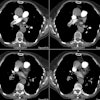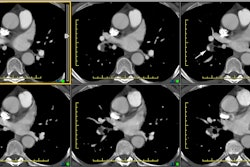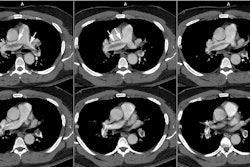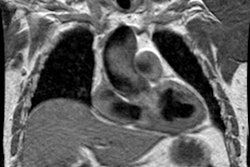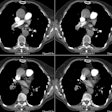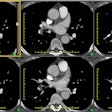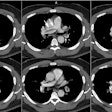Radiology 2002 May;223(2):461-7
Risk of pulmonary embolism after a negative spiral CT angiogram in patients
with pulmonary disease: 1-year clinical follow-up study.
Tillie-Leblond I, Mastora I, Radenne F, Paillard S, Tonnel AB, Remy J, Remy-Jardin
M.
PURPOSE: To evaluate the effect of pulmonary disease on diagnostic utility of
spiral computed tomographic (CT) angiography in clinical practice. MATERIALS AND
METHODS: Three hundred thirty-four patients, including 215 patients with
pulmonary disease (group 1) and 119 patients with no history of respiratory
disorder (group 2), were referred for thin-collimation CT angiography of the
pulmonary circulation as the first-line diagnostic test. Patients with negative
angiograms who had not received anticoagulation therapy and who could be
clinically followed up at 3 months, 6 months, and 1 year were considered in the
final study groups (n = 185); 135 patients had lung disease (group 3), and 50
patients had no history of a respiratory disorder (group 4). RESULTS: Between
groups 3 and 4, no significant differences were found in the referral location,
age, and risk factors. Confident evaluation of pulmonary arteries down to the
subsegmental level was performed in 31 (23%) patients in group 3 and in 15 (30%)
in group 4 (P =.5). Three episodes of acute pulmonary embolism (PE), all fatal,
were diagnosed in group 3 patients; two cases occurred 14 days and one case
occurred 6 months after the negative spiral CT scan. The negative predictive
value of spiral CT angiography was 98% (175 of 178) in the study group in which
follow-up was performed, with no significant difference between the values in
groups 3 (98% [132 of 135]) and 4 (100% [50 of 50]). CONCLUSION: Underlying
respiratory disease does not affect the negative predictive value of
thin-collimation CT angiography, which appears to be a reliable tool in the
work-up in this subgroup of patients with acute PE. Copyright RSNA, 2002
